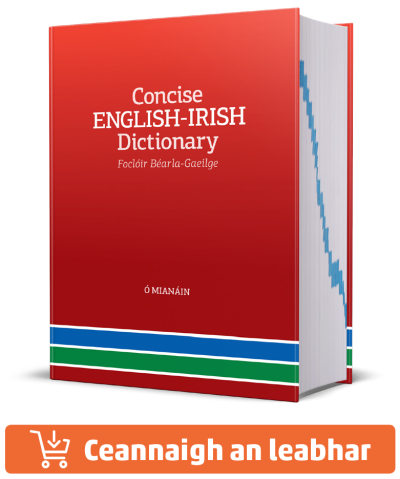Foclóir Gaeilge–Béarla
Ó Dónaill, 1977
An Foclóir Beag
Ó Dónaill & Ua Maoileoin, 1991
English–Irish Dictionary
de Bhaldraithe, 1959
Gramadach
Foghraíocht
taipéit
taipigean
taipióca
taipir
táiplis
tair
táir
tairbhe
tairbheach
táirbhéim
tairbhfeadh
tairbhí
táirbhia
tairbhigh
tairbhir
tairbhiú
tairbhiúil
taircheadal
táirchéim
tairdeal
táire
táireach
táireadh
tairbhe, f. (gs. ~, pl. -bhí). 1. Benefit, profit. (a)~ a bhaint as rud, to benefit by sth. Rud a chur chun ~, to turn sth. to account. Chuaigh sé chun ~ dó, it benefited him. Is mó an t-olc ná an ~ é, it does more harm than good. Ní fiú an ~ an trioblóid, the game is not worth the candle. Is beag an ~ é, it is not of much use. Cad é an ~ a bheith ag caint air? What’s the good of talking about it? Bhain tú an ~ as, you took the good out of it. Rud gan ~, useless thing. S.a. toirt1 1. (b) De thairbhe, by virtue of, as a result of, on account of. Dá thairbhe sin, in consequence of that. Tá rud éigin aige de thairbhe a chuid oibre, he has gained something by his work. Níor fhoghlaim mé mórán dá thairbhe, I didn’t learn much as a result of it. Níl dada dá thairbhe agam, I am no better off for it. De thairbhe a aoise, on account of his age. Ná bíodh imní ort de mo thairbhe, don’t be anxious on my account. De mo thairbhe féin de, as far as I myself am concerned. De mo thairbhese de, is cuma liom, as far as I am concerned, I don’t care. 2. Lit: Useful work.
TORTHAÍ GAOLMHARA
IN FOCLÓIR GAEILGE—BÉARLA
ABAIRTÍ
IN FOCLÓIR GAEILGE—BÉARLA
Bainfidh tú ~ tairbhe as, you will profit by it, be the better for it.
Cá tairbhe duit é? What does it profit you?
Cár thairbhe duit é? What did, would, it profit you?
Rud a chur chun sochair, chun tairbhe, do dhuine, to use sth. for s.o.’s profit, advantage.
Ba lú de thairbhe é mar sin, there was less benefit in it that way.
(Is) ~ a thairbhe duit, it is of little benefit to you.
Is mó a thairbhe ná a thaibhse, it is better than it looks.
Rachaidh sé chun tairbhe duit, it will benefit you.
~ gan tairbhe de dhuine, a useless hulk of a person.
